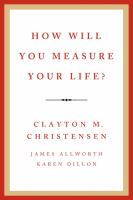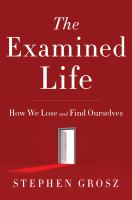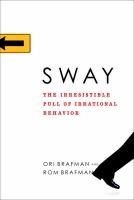Review: Books on a Meaningful Life
Something almost universally true: everyone wants to live a meaningful life. However, the good life does not happen by chance. Youthful decisions about how we spend our time and who we spend it with create the amount of meaning we experience in middle age. How we choose to spend our days is how we spend our lives.
Last month, The Startup posted contributor Thomas Oppong’s recommended books on how to live life meaningfully. Four of his selections were among my favorites, too. I have personally recommended these books to colleagues and reviewed them on this blog, some as long as a decade ago. No surprise: these books have become classics and remain “best sellers” in the Ford Library.
 Christensen, Clayton M., et al. How will you measure your life? Harper Business, 2012.
Christensen, Clayton M., et al. How will you measure your life? Harper Business, 2012.
Clayton M. Christensen, renowned professor at the Harvard Business School, is among the world’s top experts on innovation and growth. Using examples from his work with prominent global companies, he applies lessons learned to the careers and personal lives of students. He encourages students to consider the long-term results of different decisions and actions that have an impact on interpersonal relationships, personal integrity and career success. Full review.
How Will You Measure Your Life? is also available on our Business Bestseller Kindles and as an audiobook or eBook on OverDrive.
 Grosz, Stephen. The examined life : how we lose and find ourselves. W.W. Norton, 2013.
Grosz, Stephen. The examined life : how we lose and find ourselves. W.W. Norton, 2013.
In his day to day practice as a psychotherapist, Stephen Grosz helps his patients understand themselves, their masked motivations and complex feelings so they can live happier and more fulfilled lives. These touching stories from his patients teach about love and loss, intimacy and separation, change and acceptance. Full review.
The Examined Life is also available as an audiobook CD.
 Brafman, Ori, et al. Sway : the irresistible pull of irrational behavior. Doubleday, 2008.
Brafman, Ori, et al. Sway : the irresistible pull of irrational behavior. Doubleday, 2008.
This brief and entertaining book examines the hidden influences that sometimes derails even the most principled decision-maker. Psychological concepts like loss aversion, diagnosis bias and the power of commitment are explained using vibrant examples from real life. After revealing how these hidden forces drive irrational behavior and why we are vulnerable to them, the authors provide strategies for dealing with distorted thinking. Full review.
Sway is also available as an audiobook CD.
 Tavris, Carol, et al. Mistakes were made (but not by me) : why we justify foolish beliefs, bad decisions, and hurtful acts. Harcourt, 2007.
Tavris, Carol, et al. Mistakes were made (but not by me) : why we justify foolish beliefs, bad decisions, and hurtful acts. Harcourt, 2007.
It is difficult to admit mistakes but easy to find a justification for them. This book illuminates the ways our brains resolve the stress of cognitive dissonance to preserve our feelings of self-worth. The unreliable nature of memory and effects of personal bias impair our judgment in insidious ways, which ultimately impacts personal relationships, the legal justice system and seemingly objective scientific research. Full review.
© Meg Trauner & Ford Library – Fuqua School of Business.
All rights reserved.
Tags: Book Reviews